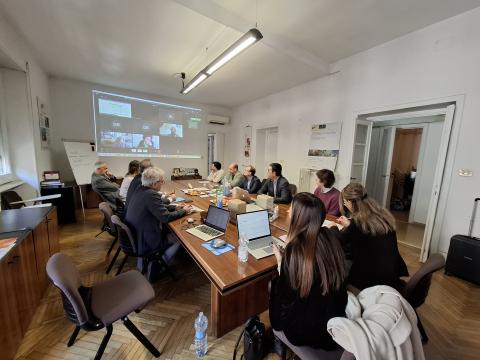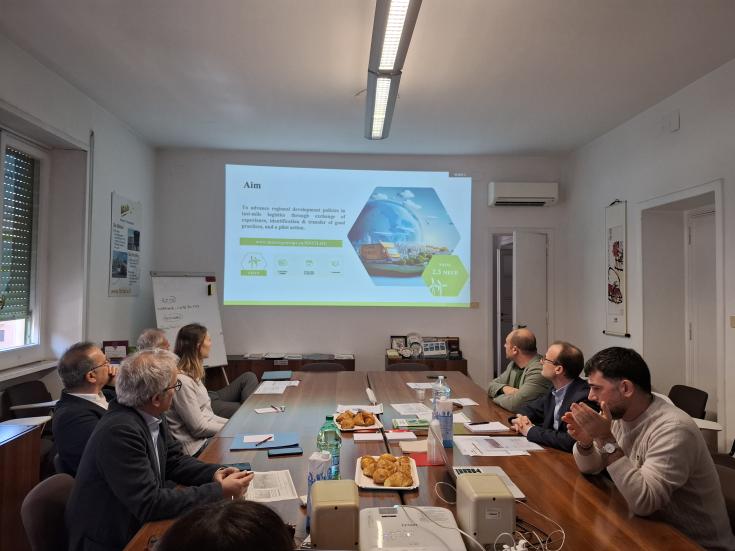Pathways to Sustainable Logistics: new RSGM in Italy
On 6 February, the 4th Regional Stakeholder Group Meeting of SPOTLOG, organised by TTS Italia and the Municipality of Rimini, was held in Rome, involving 14 in-person and 6 online participants.
The focus of the meeting was ‘Innovative Pathways to Sustainable Urban Logistics’, i.e. the illustration of some of the main Italian initiatives in the field of sustainable urban logistics.
After the welcome from TTS Italia and a round table for the presentation of all participants, Gennaro Ciccarelli, InBlenda, frames the European Interreg project SPOTLOG, emphasising the key takeaways gathered thanks to the exchange of good practices between project partners. Already this gives space for a first moment of confrontation with the participants who emphasise on the one hand how, with respect to the current dynamics of logistics, it is important to educate the purchaser and make him aware of what his choice entails, in environmental terms, on the other hand, it is equally fundamental to sensitise logistics operators to integrate ecological practices into their activities, reviewing their organisation of the logistics chain, adopting solutions that reduce environmental impact.
Carlo Michelacci, Municipality of Rimini, focuses on the Municipality's SUMP, which includes specific measures for the implementation of sustainable last-mile deliveries.
Cezar Gremi illustrated Urbico, specialised in city logistics, offering innovative scalable solutions that solve the first and last mile problem for operators who, however, are often more focused on economic sustainability.
Roma Servizi per la Mobilità, Rome's mobility agency, with Marco Surace highlights the MOVE21 project developed to transform urban areas into connected and climate-neutral multimodal urban nodes for smart and clean mobility and logistics. For cycle-logistics services, a partnership with Doctorbike, whose mission is to promote sustainable mobility in the urban context, was defined within MOVE21 by Danilo De Cesare. Feedback from suppliers who have joined is so far positive in terms of flexibility and social impact.
Valentino Sevino, AMAT, explains how logistics plays an important role in Milan's PUMS. Various measures have been taken by the city over the years, such as the creation of Area C and B, the congestion charge set up by the City of Milan; pack stations, i.e. self-service stations for collecting goods purchased online; the FRE-EVUE project, already in 2015, for the delivery of medicines within Area C; smart parking systems with the installation of ground sensors to control the loading/unloading of goods, just to mention a few. These experiences led to the creation of an Urban Logistics Technical Table whose ultimate goal is to develop an Urban Logistics Plan.
Edoardo Repetto, TRT - Transport and Territory, explains the development pole for cycling, providing training and awareness-raising for the public and private sector by giving information and guidelines for green urban logistics, focusing on bicycle and cargobike options. Lack of planning and awareness remain key issues to be solved.
Pamela Salvatore, Municipality of Lucca, recounts how through ASPIRE a pilot cargo-bike sharing system for the transport of goods within the historic centre was implemented, to offer the most sustainable logistics operators the possibility of making small deliveries in the historic centre with zero-emission vehicles and to access the ZTL even beyond the time slots allowed.

Patrizia Fiannaca, Municipality of Santarcangelo, recounts how in the last seven years the historic centre has become a very important pole of attraction for new restaurants, bars, pizzerias and shops. This phenomenon has led to a significant increase in the number of suppliers entering the ZTL on a daily basis. The Santarcangelo by cargo bike project was devised: three junctions where suppliers can park their vehicles, deposit their goods on a cargo bike at their disposal and enter the ‘Limited Traffic Zone’ to deliver them.
Ylenia Buccitti, Municipia, closed the day by presenting the UNCHAIN project to create a set of services and activities to support urban logistics for better management, planning and policy-making, thanks to the potential that technology and digitisation can bring by promoting increasingly smart and climate-neutral cities.
The meeting brought to light issues and challenges that remain common to many realities in Italy. However, the discussion well highlighted many scalable good practices that, in order to be effective, require close cooperation between all parties involved and also a regulatory part, in order to go beyond mere experimentation, which certainly remains important in terms of raising awareness and opening up dialogue.

